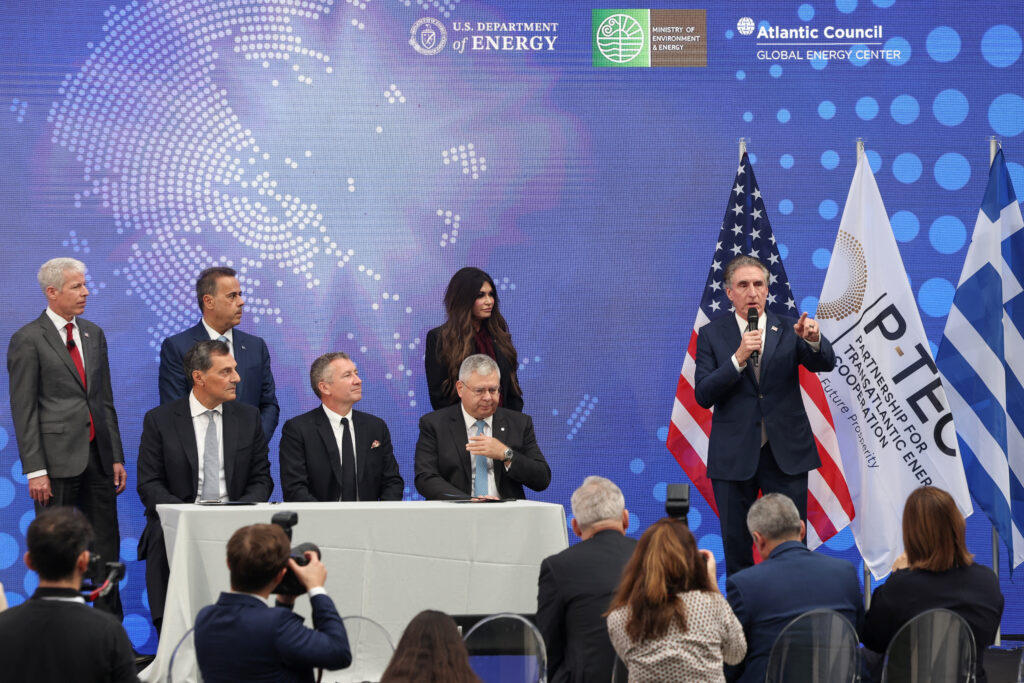Inside the Partnership for Transatlantic Energy Cooperation, as transatlantic leaders work to displace Russian gas for good – Atlantic Council

Report on the Sixth Partnership for Transatlantic Energy Cooperation (P-TEC)
Executive Summary
The sixth meeting of the Partnership for Transatlantic Energy Cooperation (P-TEC) in Athens, co-hosted by the US Department of Energy, the Ministry of Environment and Energy of Greece, and the Atlantic Council, focused on European energy security and strategic diversification away from Russian gas. Discussions and agreements at the event underscored the interconnectedness of energy policy with several Sustainable Development Goals (SDGs), particularly SDG 7 (Affordable and Clean Energy), SDG 8 (Decent Work and Economic Growth), SDG 9 (Industry, Innovation, and Infrastructure), SDG 16 (Peace, Justice, and Strong Institutions), and SDG 17 (Partnerships for the Goals). Key outcomes included a significant agreement for offshore gas exploration and a reinforced commitment to transatlantic cooperation to ensure regional stability and prosperity.
Advancing SDG 16: Peace, Justice, and Strong Institutions
Strategic Imperative to Phase Out Russian Gas
A central theme of the conference was the strategic necessity of eliminating reliance on Russian gas to promote regional peace and stability, a direct contribution to SDG 16.
- Stavros Papastavrou, Greece’s energy and environment minister, stated, “Funding aggression is not good. We believe strongly that for the stability, the peace, and the prosperity of the region, we need to totally phase out from Russian gas.”
- US Energy Secretary Chris Wright emphasized that displacing Russian gas ensures that funds do not go “into the pockets of [Russian President Vladimir Putin] and to the Russian war machine.”
- US Interior Secretary Doug Burgum argued that enabling allies to stop purchasing energy from adversaries is a critical step toward achieving global “peace” and “prosperity.”
Fostering SDG 7 (Affordable Energy) and SDG 8 (Economic Growth)
Energy Affordability as a Foundation for Prosperity
Speakers highlighted the critical role of affordable and reliable energy in achieving sustainable economic growth and improving human welfare, aligning with the principles of SDG 7 and SDG 8.
- Secretary Wright noted that affordable energy supplies “expand people’s life opportunities,” including access to safer and healthier living conditions.
- Secretary Burgum asserted that affordable energy allows people to move beyond subsistence and “start doing the things that allow them to flourish.” He stated, “The moral high ground belongs to the people that believe in affordable, reliable, and secure energy.”
New Initiatives for Energy Security and Economic Development
The conference saw the launch of new projects aimed at enhancing energy security and stimulating economic activity, thereby supporting the objectives of SDG 8.
- An agreement was signed by Energean, HelleniQ Energy, and ExxonMobil for exploratory offshore drilling off the coast of Greece. Minister Papastavrou noted this is the first such operation in forty years and, “if successful, it will provide for Greece and for Europe domestic resources.”
- US Ambassador to Greece Kimberly Guilfoyle described the deal as a move toward “energy dominance and stability for the great Hellenic Republic” and a necessary counter to Russian and Chinese interests to protect national security.
Driving SDG 9: Industry, Innovation, and Infrastructure
Developing Resilient Energy Infrastructure
The development of new energy infrastructure was presented as a cornerstone of regional cooperation and a key enabler for achieving SDG 9.
- Minister Papastavrou highlighted ongoing work on the Vertical Gas Corridor, a network designed to transmit liquefied natural gas from Greece to northern European countries, including Romania, Hungary, and Ukraine.
- He stressed a collaborative approach, stating, “There’s only one way forward: Working together . . . creating infrastructure for one region to support peace, stability, and prosperity.”
- Secretary Wright affirmed the United States’ readiness to cooperate on building the necessary infrastructure to deliver US gas to Europe.
Energy as a Catalyst for Technological Innovation
The relationship between energy availability and the next wave of technological innovation, particularly artificial intelligence (AI), was a key topic of discussion, linking energy policy directly to SDG 9.
- Secretary Burgum noted that while AI increases energy demand, it also provides innovative solutions across various sectors. He predicted that capital investment in AI will concentrate in regions with “low energy costs.”
- He warned that countries with policies that increase energy prices risk missing out on the investment driving this technological revolution.
- Concerns were raised regarding the European regulatory environment. Secretary Wright identified the Corporate Sustainability Due Diligence Directive as a potential “existential risk to affordable energy” in Europe, cautioning that excessive risk and cost could divert gas supplies elsewhere.
Conclusion: The Role of SDG 17 (Partnerships for the Goals)
Transatlantic Cooperation as a Key Enabler
The P-TEC meeting itself, along with the agreements and collaborative projects discussed, serves as a powerful example of SDG 17 in action. The partnership between the United States, Greece, and other European nations demonstrates a shared commitment to leveraging international cooperation to address complex challenges at the intersection of energy security, economic development, and global peace.
Analysis of Sustainable Development Goals in the Article
1. Which SDGs are addressed or connected to the issues highlighted in the article?
-
SDG 7: Affordable and Clean Energy
- The article’s central theme is energy, focusing on ensuring energy security, affordability, and reliability for Europe. It discusses the need for policies that “lower the price of energy” and provide “affordable, reliable, and secure energy.” This directly aligns with the goal of ensuring access to affordable energy for all.
-
SDG 8: Decent Work and Economic Growth
- The article connects affordable energy directly to economic prosperity. It states that affordable energy supplies “expand people’s life opportunities” and allow them to “flourish.” Furthermore, it argues that countries with low energy costs will attract the “next wave of investment,” which is essential for economic growth.
-
SDG 9: Industry, Innovation, and Infrastructure
- The development of new energy infrastructure is a key topic, including the signing of a deal for “exploratory offshore drilling off the coast of Greece” and the establishment of the “Vertical Gas Corridor.” The article also discusses the importance of fostering innovation, particularly in Artificial Intelligence (AI), which requires significant energy and a supportive “regulatory environment that allows innovation to flourish.”
-
SDG 16: Peace, Justice, and Strong Institutions
- A primary motivation for the energy initiatives discussed is to enhance regional peace and stability. The article explicitly states the goal is to “totally phase out from Russian gas” to ensure the “stability, the peace, and the prosperity of the region.” This is framed as a measure to stop “funding aggression” and the “Russian war machine,” directly linking energy policy to the promotion of peaceful societies.
-
SDG 17: Partnerships for the Goals
- The entire event described, the “Partnership for Transatlantic Energy Cooperation (P-TEC),” is a multi-stakeholder partnership involving governments (US, Greece) and international organizations (Atlantic Council). The article highlights the importance of cooperation, stating, “There’s only one way forward: Working together.” The deal signed between three energy companies, presided over by government officials, is a clear example of a public-private partnership.
2. What specific targets under those SDGs can be identified based on the article’s content?
-
Target 7.1: By 2030, ensure universal access to affordable, reliable and modern energy services.
- The article strongly emphasizes this target through repeated calls for “affordable, reliable, and secure energy.” US Interior Secretary Doug Burgum is quoted saying, “The moral high ground belongs to the people that believe in affordable, reliable, and secure energy.” The focus is on lowering energy prices to improve life opportunities.
-
Target 9.1: Develop quality, reliable, sustainable and resilient infrastructure…to support economic development and human well-being.
- This target is addressed through the specific infrastructure projects mentioned. The deal for “exploratory offshore drilling” and the creation of the “Vertical Gas Corridor, a network that would transmit liquefied natural gas from Greece to countries such as Romania, Hungary, and Ukraine” are direct efforts to develop new, reliable energy infrastructure.
-
Target 16.1: Significantly reduce all forms of violence and related death rates everywhere.
- While not directly about reducing violence, the article’s rationale for phasing out Russian gas is explicitly linked to this target’s spirit. The argument is that stopping gas imports means funds do “not go into the pockets of [Russian President Vladimir Putin] and to the Russian war machine.” This is a direct attempt to weaken a state engaged in conflict, thereby contributing to the goal of peace.
-
Target 17.17: Encourage and promote effective public, public-private and civil society partnerships.
- The article provides a concrete example of this target in action. The P-TEC conference itself is a public-private partnership. The signing of a deal between private companies (Energean, HelleniQ Energy, and ExxonMobil) with government officials (from the US and Greece) presiding is a clear instance of promoting such partnerships to achieve common goals.
3. Are there any indicators mentioned or implied in the article that can be used to measure progress towards the identified targets?
-
For Target 7.1 (Affordable Energy):
- Implied Indicator: The price of energy for consumers and businesses in Europe. The article’s emphasis on the need for policies that “lower the price of energy” implies that energy cost is a key metric for success.
-
For Target 9.1 (Infrastructure):
- Implied Indicator: Volume of domestic gas resources developed and transported. The success of the new offshore drilling operation and the transmission capacity of the Vertical Gas Corridor are measurable outcomes that would indicate progress.
-
For Target 16.1 (Peace and Stability):
- Implied Indicator: The volume and value of Russian gas imports into the EU. The stated goal is to “totally phase out from Russian gas” and “displace all of the Russian gas.” A reduction to zero would be the ultimate measure of success for this objective.
-
For Target 17.17 (Partnerships):
- Indicator: The number of multi-stakeholder agreements and joint ventures established. The article explicitly mentions the deal signed between Energean, HelleniQ Energy, and ExxonMobil as a key outcome of the P-TEC partnership, which serves as a direct indicator.
4. Table of SDGs, Targets, and Indicators
| SDGs | Targets | Indicators |
|---|---|---|
| SDG 7: Affordable and Clean Energy | Target 7.1: Ensure universal access to affordable, reliable and modern energy services. | Implied Indicator: The consumer and industrial price of energy in Europe. |
| SDG 9: Industry, Innovation, and Infrastructure | Target 9.1: Develop quality, reliable, sustainable and resilient infrastructure. | Implied Indicator: Development and operational capacity of new energy infrastructure (e.g., offshore drilling sites, Vertical Gas Corridor). |
| SDG 16: Peace, Justice, and Strong Institutions | Target 16.1: Significantly reduce all forms of violence and related death rates everywhere. | Implied Indicator: Reduction in the volume and value of Russian gas imported by the EU, with a goal of a “total phase out.” |
| SDG 17: Partnerships for the Goals | Target 17.17: Encourage and promote effective public, public-private and civil society partnerships. | Indicator: The number and scope of public-private energy agreements signed, such as the deal between ExxonMobil, HelleniQ Energy, and Energean. |
Source: atlanticcouncil.org
What is Your Reaction?
 Like
0
Like
0
 Dislike
0
Dislike
0
 Love
0
Love
0
 Funny
0
Funny
0
 Angry
0
Angry
0
 Sad
0
Sad
0
 Wow
0
Wow
0













































































